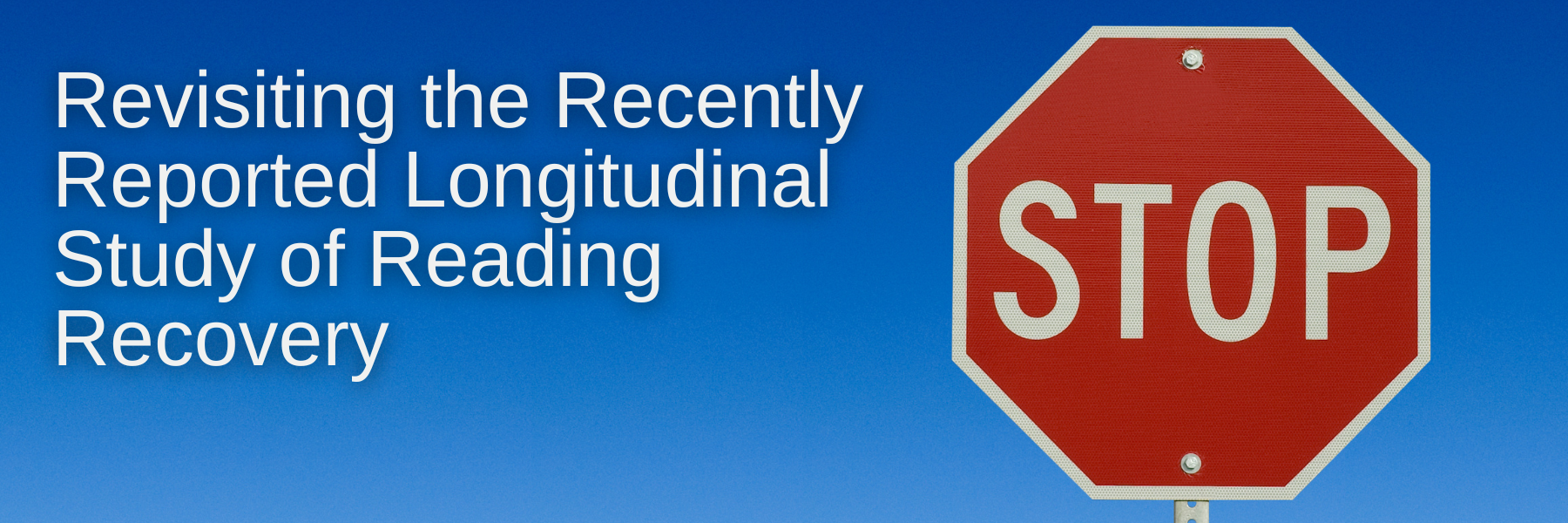BLOG
Revisiting the Recently Reported Longitudinal Study of Reading Recovery
In her most recent podcast, Emily Hanford includes information about an AERA research presentation by Dr. Henry May, professor at the University of Delaware, that showed Reading Recovery students did not sustain gains through 3rd -4th grades. The flawed regression discontinuity methodology was addressed by researchers during the presentation and in writing afterward by the Reading Recovery community. We reiterate both the positive observations and the flaws of this study below.
Established Understandings of Reading Recovery Confirmed by the Current Research
- Reading Recovery is a massively effective early literacy intervention with the lowest-achieving first-grade children. These findings replicate evidence resulting from previous, large-scale, national investigations (May et al, 2013, 2015a, 2015b, 2022).
- The current study confirms yet again that Reading Recovery has immediate highly positive outcomes for children selected as the most vulnerable and lowest performers in reading in the first-grade classroom.
Flaws in Study Procedures that Delimit Results
- There was a 75% attrition rate in the study. Only 25% of the original group of students were available for data collection. Additionally, third-grade test scores were available for approximately 27% of the total sample and fourth-grade test scores were available for approximately 17% of the total number of control students. This level of attrition delimits any inferences that can be drawn from this study.
- The control group and the treatment group were not equivalent. The control group students did not receive Reading Recovery because they were not the lowest literacy learners in their first-grade classrooms and were able to learn with classroom teaching.
- The types of instructional support and materials provided in years, two, three, and four were not considered by May’s study.
- May’s study indicated that children did not continue to make adequate progress over time. However, at the same conference a study from the United Kingdom, Hurry, Fridkin and Holliman’s study showed long-term positive effects of Reading Recovery on UK students at age 16. Multiple longitudinal studies on Reading Recovery outcomes in the U.S. have shown positive results.
When asked by an audience member at Dr. May’s AERA presentation, “What would you suggest instead of Reading Recovery?” May replied that “they [schools] give 1st graders Reading Recovery and make sure they follow-up on the students later.”
Additionally, May stated that “Reading Recovery is the only intervention to step up and submit itself to rigorous design.” (AERA Conference, 2022)
It is important to note that Reading Recovery® and Reading Recovery Council of North America are not-for-profit institutions that have successfully served nearly 2.5 million struggling readers over more than three decades in the United States.
References
Blakeney, A. & May, H. (2022). Replication of short-term experimental impacts of Reading Recovery’s investing in innovation fund (i3) Scale-up with regression discontinuity. Paper presented at the annual conference of the American Education Research Association.
Consortium for Policy Research in Education. (2013). Evaluation of the i3 scale up of Reading Recovery: Year One report 2011–2012. Philadelphia, PA: University of Pennsylvania. Retrieved from http://www.cpre.org/evaluation-i3-scale- reading-recovery-year-one-report-2011-12
Consortium for Policy Research in Education. (2015a). Evaluation of the i3 scale up of Reading Recovery: Year Two report 2012–2013. Philadelphia, PA: University of Pennsylvania. Retrieved from http://www.cpre.org/rryr2
Consortium for Policy Research in Education. (2015b). Evaluation of the i3 scale up of Reading Recovery: Years Three and Four report 2013–2015. Philadelphia, PA: University of Pennsylvania.
Harmey, S. & Anders, J. (2018). An analysis of the performance of Reading Recovery students on the phonics. Poster presented at the 25th Meeting of the Society for the Scientific Studies of Reading, Brighton, UK, available at https://www.triplesr.org/analysis-performance-reading-recovery-students-phonics-screening-check
Hurry, J., Fridkin, L., Holliman, A. (2021). Reading intervention in the UK on qualifications and support at age 16. British Education Research Journal, 48 (1), 5 -21.
THE JOURNAL OF READING RECOVERY
Spring 2024
Constructing a More Complex Neural Network for Working on Written Language That Learns to Extend Itself by Carol A. Lyons
Reading Recovery IS the Science(s) of Reading and the Art of Teaching by Debra Semm Rich
Predictions of Progress: Charting, Adjusting, and Shaping Individual Lessons by Janice Van Dyke and Melissa Wilde
Teachers Designing for Context: Using Integrity Principles to Design Early Literacy Support in Aotearoa New Zealand by Rebecca Jesson, Judy Aitken, and Yu Liu




